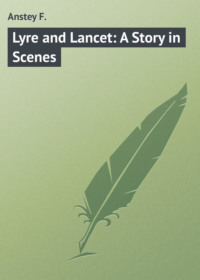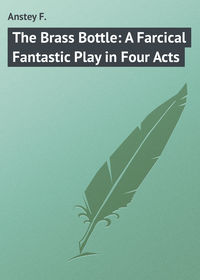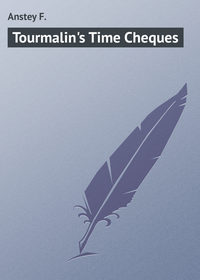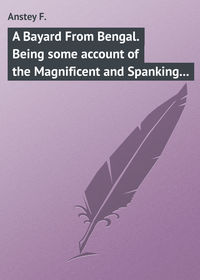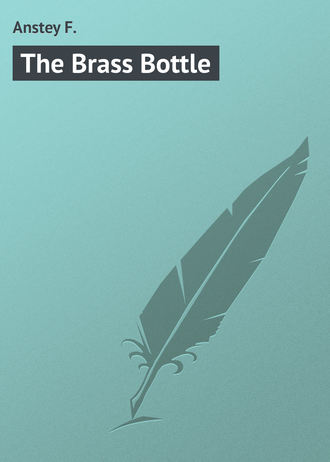 полная версия
полная версияThe Brass Bottle
"Oriental metaphor!" said Horace. "She was a little overstrung. Of course, if I had had any idea she would make such a scene as that – Sylvia," he broke off, "you don't doubt me?"
"No, Horace," said Sylvia, simply, "I'm sure you must have some explanation – only I do think it would be better if you gave it."
"If I told you the truth," said Horace, slowly, "you would none of you believe me!"
"Then you admit," put in the Professor, "that hitherto you have not been telling the truth?"
"Not as invariably as I could have wished," Horace confessed.
"So I suspected. Then, unless you can bring yourself to be perfectly candid, you can hardly wonder at our asking you to consider your engagement as broken off?"
"Broken off!" echoed Horace. "Sylvia, you won't give me up! You know I wouldn't do anything unworthy of you!"
"I'm certain that you can't have done anything which would make me love you one bit the less if I knew it. So why not be quite open with us?"
"Because, darling," said Horace, "I'm in such a fix that it would only make matters worse."
"In that case," said the Professor, "and as it is already rather late, perhaps you will allow one of your numerous retinue to call a four-wheeler?"
Horace clapped his hands, but no one answered the summons, and he could not find any of the slaves in the antechamber.
"I'm afraid all the servants have left," he explained; and it is to be feared he would have added that they were all obliged to return to the contractor by eleven, only he caught the Professor's eye and decided that he had better refrain. "If you will wait here, I'll go out and fetch a cab," he added.
"There is no occasion to trouble you," said the Professor; "my wife and daughter have already got their things on, and we will walk until we find a cab. Now, Mr. Ventimore, we will bid you good-night and good-bye. For, after what has happened, you will, I trust, have the good taste to discontinue your visits and make no attempt to see Sylvia again."
"Upon my honour," protested Horace, "I have done nothing to warrant you in shutting your doors against me."
"I am unable to agree with you. I have never thoroughly approved of your engagement, because, as I told you at the time, I suspected you of recklessness in money matters. Even in accepting your invitation to-night I warned you, as you may remember, not to make the occasion an excuse for foolish extravagance. I come here, and find you in apartments furnished and decorated (as you informed us) by yourself, and on a scale which would be prodigal in a millionaire. You have a suite of retainers which (except for their nationality and imperfect discipline) a prince might envy. You provide a banquet of – hem! – delicacies which must have cost you infinite trouble and unlimited expense – this, after I had expressly stipulated for a quiet family dinner! Not content with that, you procure for our diversion Arab music and dancing of a – of a highly recondite character. I should be unworthy of the name of father, sir, if I were to entrust my only daughter's happiness to a young man with so little common sense, so little self-restraint. And she will understand my motives and obey my wishes."
"You're right, Professor, according to your lights," admitted Horace. "And yet – confound it all! – you're utterly wrong, too!"
"Oh, Horace," cried Sylvia; "if you had only listened to dad, and not gone to all this foolish, foolish expense, we might have been so happy!"
"But I have gone to no expense. All this hasn't cost me a penny!"
"Ah, there is some mystery! Horace, if you love me, you will explain – here, now, before it's too late!"
"My darling," groaned Horace, "I would, like a shot, if I thought it would be of the least use!"
"Hitherto," said the Professor, "you cannot be said to have been happy in your explanations – and I should advise you not to venture on any more. Good-night, once more. I only wish it were possible, without needless irony, to make the customary acknowledgments for a pleasant evening."
Mrs. Futvoye had already hurried her daughter away, and, though she had left her husband to express his sentiments unaided, she made it sufficiently clear that she entirely agreed with them.
Horace stood in the outer hall by the fountain, in which his drowned chrysanthemums were still floating, and gazed in stupefied despair after his guests as they went down the path to the gate. He knew only too well that they would never cross his threshold, nor he theirs, again.
Suddenly he came to himself with a start. "I'll try it!" he cried. "I can't and won't stand this!" And he rushed after them bareheaded.
"Professor!" he said breathlessly, as he caught him up, "one moment. On second thoughts, I will tell you my secret, if you will promise me a patient hearing."
"The pavement is hardly the place for confidences," replied the Professor, "and, if it were, your costume is calculated to attract more remark than is desirable. My wife and daughter have gone on – if you will permit me, I will overtake them – I shall be at home to-morrow morning, should you wish to see me."
"No – to-night, to-night!" urged Horace. "I can't sleep in that infernal place with this on my mind. Put Mrs. Futvoye and Sylvia into a cab, Professor, and come back. It's not late, and I won't keep you long – but for Heaven's sake, let me tell you my story at once."
Probably the Professor was not without some curiosity on the subject; at all events he yielded. "Very well," he said, "go into the house and I will rejoin you presently. Only remember," he added, "that I shall accept no statement without the fullest proof. Otherwise you will merely be wasting your time and mine."
"Proof!" thought Horace, gloomily, as he returned to his Arabian halls, "The only decent proof I could produce would be old Fakrash, and he's not likely to turn up again – especially now I want him."
A little later the Professor returned, having found a cab and despatched his women-folk home. "Now, young man," he said, as he unwound his wrapper and seated himself on the divan by Horace's side, "I can give you just ten minutes to tell your story in, so let me beg you to make it as brief and as comprehensible as you can."
It was not exactly an encouraging invitation in the circumstances, but Horace took his courage in both hands and told him everything, just as it had happened.
"And that's your story?" said the Professor, after listening to the narrative with the utmost attention, when Horace came to the end.
"That's my story, sir," said Horace. "And I hope it has altered your opinion of me."
"It has," replied the Professor, in an altered tone; "it has indeed. Yours is a sad case – a very sad case."
"It's rather awkward, isn't it? But I don't mind so long as you understand. And you'll tell Sylvia – as much as you think proper?"
"Yes – yes; I must tell Sylvia."
"And I may go on seeing her as usual?"
"Well – will you be guided by my advice – the advice of one who has lived more than double your years?"
"Certainly," said Horace.
"Then, if I were you, I should go away at once, for a complete change of air and scene."
"That's impossible, sir – you forget my work!"
"Never mind your work, my boy: leave it for a while, try a sea-voyage, go round the world, get quite away from these associations."
"But I might come across the Jinnee again," objected Horace; "he's travelling, as I told you."
"Yes, yes, to be sure. Still, I should go away. Consult any doctor, and he'll tell you the same thing."
"Consult any – Good God!" cried Horace; "I see what it is – you think I'm mad!"
"No, no, my dear boy," said the Professor, soothingly, "not mad – nothing of the sort; perhaps your mental equilibrium is just a trifle – it's quite intelligible. You see, the sudden turn in your professional prospects, coupled with your engagement to Sylvia – I've known stronger minds than yours thrown off their balance – temporarily, of course, quite temporarily – by less than that."
"You believe I am suffering from delusions?"
"I don't say that. I think you may see ordinary things in a distorted light."
"Anyhow, you don't believe there really was a Jinnee inside that bottle?"
"Remember, you yourself assured me at the time you opened it that you found nothing whatever inside it. Isn't it more credible that you were right then than that you should be right now?"
"Well," said Horace, "you saw all those black slaves; you ate, or tried to eat, that unutterably beastly banquet; you heard that music – and then there was the dancing-girl. And this hall we're in, this robe I've got on – are they delusions? Because if they are, I'm afraid you will have to admit that you're mad too."
"Ingeniously put," said the Professor. "I fear it is unwise to argue with you. Still, I will venture to assert that a strong imagination like yours, over-heated and saturated with Oriental ideas – to which I fear I may have contributed – is not incapable of unconsciously assisting in its own deception. In other words, I think that you may have provided all this yourself from various quarters without any clear recollection of the fact."
"That's very scientific and satisfactory as far as it goes, my dear Professor," said Horace; "but there's one piece of evidence which may upset your theory – and that's this brass bottle."
"If your reasoning powers were in their normal condition," said the Professor, compassionately, "you would see that the mere production of an empty bottle can be no proof of what it contained – or, for that matter, that it ever contained anything at all!"
"Oh, I see that," said Horace; "but this bottle has a stopper with what you yourself admit to be an inscription of some sort. Suppose that inscription confirms my story – what then? All I ask you to do is to make it out for yourself before you decide that I'm either a liar or a lunatic."
"I warn you," said the Professor, "that if you are trusting to my being unable to decipher the inscription, you are deceiving yourself. You represent that this bottle belongs to the period of Solomon – that is, about a thousand years B.C. Probably you are not aware that the earliest specimens of Oriental metal-work in existence are not older than the tenth century of our era. But, granting that it is as old as you allege, I shall certainly be able to read any inscription there may be on it. I have made out clay tablets in Cuneiform which were certainly written a thousand years before Solomon's time."
"So much the better," said Horace. "I'm as certain as I can be that, whatever is written on that lid – whether it's Phœnician, or Cuneiform, or anything else – must have some reference to a Jinnee confined in the bottle, or at least bear the seal of Solomon. But there the thing is – examine it for yourself."
"Not now," said the Professor; "it's too late, and the light here is not strong enough. But I'll tell you what I will do. I'll take this stopper thing home with me, and examine it carefully to-morrow – on one condition."
"You have only to name it," said Horace.
"My condition is, that if I, and one or two other Orientalists to whom I may submit it, come to the conclusion that there is no real inscription at all – or, if any, that a date and meaning must be assigned to it totally inconsistent with your story – you will accept our finding and acknowledge that you have been under a delusion, and dismiss the whole affair from your mind."
"Oh, I don't mind agreeing to that," said Horace, "particularly as it's my only chance."
"Very well, then," said the Professor, as he removed the metal cap and put it in his pocket; "you may depend upon hearing from me in a day or two. Meantime, my boy," he continued, almost affectionately, "why not try a short bicycle tour somewhere, hey? You're a cyclist, I know – anything but allow yourself to dwell on Oriental subjects."
"It's not so easy to avoid dwelling on them as you think!" said Horace, with rather a dreary laugh. "And I fancy, Professor, that – whether you like it or not – you'll have to believe in that Jinnee of mine sooner or later."
"I can scarcely conceive," replied the Professor, who was by this time at the outer door, "any degree of evidence which could succeed in convincing me that your brass bottle had ever contained an Arabian Jinnee. However, I shall endeavour to preserve an open mind on the subject. Good evening to you."
As soon as he was alone, Horace paced up and down his deserted halls in a state of simmering rage as he thought how eagerly he had looked forward to his little dinner-party; how intimate and delightful it might have been, and what a monstrous and prolonged nightmare it had actually proved. And at the end of it there he was – in a fantastic, impossible dwelling, deserted by every one, his chances of setting himself right with Sylvia hanging on the slenderest thread; unknown difficulties and complications threatening him from every side!
He owed all this to Fakrash. Yes, that incorrigibly grateful Jinnee, with his antiquated notions and his high-flown professions, had contrived to ruin him more disastrously than if he had been his bitterest foe! Ah! if he could be face to face with him once more – if only for five minutes – he would be restrained by no false delicacy: he would tell him fairly and plainly what a meddling, blundering old fool he was. But Fakrash had taken his flight for ever: there were no means of calling him back – nothing to be done now but go to bed and sleep – if he could!
Exasperated by the sense of his utter helplessness, Ventimore went to the arch which led to his bed-chamber and drew the curtain back with a furious pull. And just within the archway, standing erect with folded arms and the smile of fatuous benignity which Ventimore was beginning to know and dread, was the form of Fakrash-el-Aamash, the Jinnee!
CHAPTER X
NO PLACE LIKE HOME!"May thy head long survive!" said Fakrash, by way of salutation, as he stepped through the archway.
"You're very good," said Horace, whose anger had almost evaporated in the relief of the Jinnee's unexpected return, "but I don't think any head can survive this sort of thing long."
"Art thou content with this dwelling I have provided for thee?" inquired the Jinnee, glancing around the stately hall with perceptible complacency.
It would have been positively brutal to say how very far from contented he felt, so Horace could only mumble that he had never been lodged like that before in all his life.
"It is far below thy deserts," Fakrash observed graciously. "And were thy friends amazed at the manner of their entertainment?"
"They were," said Horace.
"A sure method of preserving friends is to feast them with liberality," remarked the Jinnee.
This was rather more than Horace's temper could stand. "You were kind enough to provide my friends with such a feast," he said, "that they'll never come here again."
"How so? Were not the meats choice and abounding in fatness? Was not the wine sweet, and the sherbet like unto perfumed snow?"
"Oh, everything was – er – as nice as possible," said Horace. "Couldn't have been better."
"Yet thou sayest that thy friends will return no more – for what reason?"
"Well, you see," explained Horace, reluctantly, "there's such a thing as doing people too well. I mean, it isn't everybody that appreciates Arabian cooking. But they might have stood that. It was the dancing-girl that did for me."
"I commanded that a houri, lovelier than the full moon, and graceful as a young gazelle, should appear for the delight of thy guests."
"She came," said Horace, gloomily.
"Acquaint me with that which hath occurred – for I perceive plainly that something hath fallen out contrary to thy desires."
"Well," said Horace, "if it had been a bachelor party, there would have been no harm in the houri; but, as it happened, two of my guests were ladies, and they – well, they not unnaturally put a wrong construction on it all."
"Verily," exclaimed the Jinnee, "thy words are totally incomprehensible to me."
"I don't know what the custom may be in Arabia," said Horace, "but with us it is not usual for a man to engage a houri to dance after dinner to amuse the lady he is proposing to marry. It's the kind of attention she'd be most unlikely to appreciate.
"Then was one of thy guests the damsel whom thou art seeking to marry?"
"She was," said Horace, "and the other two were her father and mother. From which you may imagine that it was not altogether agreeable for me when your gazelle threw herself at my feet and hugged my knees and declared that I was the light of her eyes. Of course, it all meant nothing – it's probably the conventional behaviour for a gazelle, and I'm not reflecting upon her in the least. But, in the circumstances, it was compromising."
"I thought," said Fakrash, "that thou assuredst me that thou wast not contracted to any damsel?"
"I think I only said that there was no one whom I would trouble you to procure as a wife for me," replied Horace; "I certainly was engaged – though, after this evening, my engagement is at an end – unless … that reminds me, do you happen to know whether there really was an inscription on the seal of your bottle, and what it said?"
"I know naught of any inscription," said the Jinnee; "bring me the seal that I may see it."
"I haven't got it by me at this moment," said Horace; "I lent it to my friend – the father of this young lady I told you of. You see, Mr. Fakrash, you got me into – I mean, I was in such a hole over this affair that I was obliged to make a clean breast of it to him. And he wouldn't believe it, so it struck me that there might be an inscription of some sort on the seal, saying who you were, and why Solomon had you confined in the bottle. Then the Professor would be obliged to admit that there's something in my story."
"Truly, I wonder at thee and at the smallness of thy penetration," the Jinnee commented; "for if there were indeed any writing upon this seal, it is not possible that one of thy race should be able to decipher it."
"Oh, I beg your pardon," said Horace; "Professor Futvoye is an Oriental scholar; he can make out any inscription, no matter how many thousands of years old it may be. If anything's there, he'll decipher it. The question is whether anything is there."
The effect of this speech on Fakrash was as unexpected as it was inexplicable: the Jinnee's features, usually so mild, began to work convulsively until they became terrible to look at, and suddenly, with a fierce howl, he shot up to nearly double his ordinary stature.
"O thou of little sense and breeding!" he cried, in a loud voice; "how camest thou to deliver the bottle in which I was confined into the hands of this learned man?"
Ventimore, startled as he was, did not lose his self-possession. "My dear sir," he said, "I did not suppose you could have any further use for it. And, as a matter of fact, I didn't give Professor Futvoye the bottle – which is over there in the corner – but merely the stopper. I wish you wouldn't tower over me like that – it gives me a crick in the neck to talk to you. Why on earth should you make such a fuss about my lending the seal; what possible difference can it make to you even if it does confirm my story? And it's of immense importance to me that the Professor should believe I told the truth."
"I spoke in haste," said the Jinnee, slowly resuming his normal size, and looking slightly ashamed of his recent outburst as well as uncommonly foolish. "The bottle truly is of no value; and as for the stopper, since it is but lent, it is no great matter. If there be any legend upon the seal, perchance this learned man of whom thou speakest will by this time have deciphered it?"
"No," said Horace, "he won't tackle it till to-morrow. And it's as likely as not that when he does he won't find any reference to you– and I shall be up a taller tree than ever!"
"Art thou so desirous that he should receive proof that thy story is true?"
"Why, of course I am! Haven't I been saying so all this time?"
"Who can satisfy him so surely as I?"
"You!" cried Horace. "Do you mean to say you really would? Mr. Fakrash, you are an old brick! That would be the very thing!"
"There is naught," said the Jinnee, smiling indulgently, "that I would not do to promote thy welfare, for thou hast rendered me inestimable service. Acquaint me therefore with the abode of this sage, and I will present myself before him, and if haply he should find no inscription upon the seal, or its purport should be hidden from him, then will I convince him that thou hast spoken the truth and no lie."
Horace very willingly gave him the Professor's address. "Only don't drop in on him to-night, you know," he thought it prudent to add, "or you might startle him. Call any time after breakfast to-morrow, and you'll find him in."
"To-night," said Fakrash, "I return to pursue my search after Suleyman (on whom be peace!). For not yet have I found him."
"If you will try to do so many things at once," said Horace, "I don't see how you can expect much result."
"At Nineveh they knew him not – for where I left a city I found but a heap of ruins, tenanted by owls and bats."
"They say the lion and the lizard keep the Courts– " murmured Horace, half to himself. "I was afraid you might be disappointed with Nineveh myself. Why not run over to Sheba? You might hear of him there."
"Seba of El-Yemen – the country of Bilkees, the Queen beloved of Suleyman," said the Jinnee. "It is an excellent suggestion, and I will follow it without delay."
"But you won't forget to look in on Professor Futvoye to-morrow, will you?"
"Assuredly I will not. And now, ere I depart, tell me if there be any other service I may render thee."
Horace hesitated. "There is just one," he said, "only I'm afraid you'll be offended if I mention it."
"On the head and the eye be thy commands!" said the Jinnee; "for whatsoever thou desirest shall be accomplished, provided that it lie within my power to perform it."
"Well," said Horace, "if you're sure you don't mind, I'll tell you. You've transformed this house into a wonderful place, more like the Alhambra – I don't mean the one in Leicester Square – than a London lodging-house. But then I am only a lodger here, and the people the house belongs to – excellent people in their way – would very much rather have the house as it was. They have a sort of idea that they won't be able to let these rooms as easily as the others."
"Base and sordid dogs!" said the Jinnee, with contempt.
"Possibly," said Horace, "it's narrow-minded of them – but that's the way they look at it. They've actually left rather than stay here. And it's their house – not mine."
"If they abandon this dwelling, thou wilt remain in the more secure possession."
"Oh, shall I, though? They'll go to law and have me turned out, and I shall have to pay ruinous damages into the bargain. So, you see, what you intended as a kindness will only bring me bad luck."
"Come – without more words – to the statement of thy request," said Fakrash, "for I am in haste."
"All I want you to do," replied Horace, in some anxiety as to what the effect of his request would be, "is to put everything here back to what it was before. It won't take you a minute."
"Of a truth," exclaimed Fakrash, "to bestow a favour upon thee is but a thankless undertaking, for not once, but twice, hast thou rejected my benefits – and now, behold, I am at a loss to devise means to gratify thee!"
"I know I've abused your good nature," said Horace; "but if you'll only do this, and then convince the Professor that my story is true, I shall be more than satisfied. I'll never ask another favour of you!"
"My benevolence towards thee hath no bounds – as thou shalt see; and I can deny thee nothing, for truly thou art a worthy and temperate young man. Farewell, then, and be it according to thy desire."
He raised his arms above his head, and shot up like a rocket towards the lofty dome, which split asunder to let him pass. Horace, as he gazed after him, had a momentary glimpse of deep blue sky, with a star or two that seemed to be hurrying through the transparent opal scud, before the roof closed in once more.




